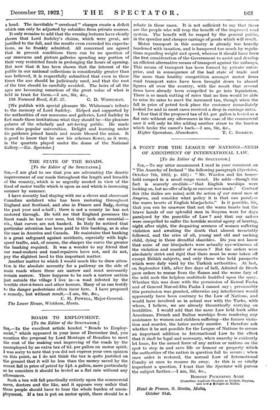ROADS TO EMPLOYMENT.
[To the Editor of the SPECTATOR.] Snt,—In the excellent article headed " Roads to Employ- ment," which appeared in your issue of December 2nd, you mention the proposal by Lord Montagu of Beaulieu to meet the cost of the making and improving of the roads by the unemployed by an extra tax of 8d. per gallon on motor spirit. I was sorry to note that you did not express your own opinion on this point, as I do not think the tax is quite justified on the ground that it will be less than the money saved by the recent fall in price of petrol by 5d. a gallon, more particularly as he considers it should be levied as a flat rate without any allowances.
Such a tax will fall practically entirely upon the commercial users, doctors and the like, and it appears very unfair that these people should have to bear the whole burden of unem- ployment. If a tax is put on motor spirit, there should be a rebate in these cases. It is not sufficient to say that these are the people who will reap the benefit of the improved road system. The benefit will be reaped by the general public, in the speedier and cheaper carriage of goods which will result.
Motor transport in this country is already too heavily burdened with taxation, and is hampered too much by regula- tions regarding weight and speed, whereas it should have been the first consideration of the Government to assist and develop an efficient alternative means of transport against the railways, This means of transport has been formed by private enter- prise, and in consequence of the bad state of trade and the more than healthy competition amongst motor firms road transport rates have been brought down to absurd figures all over the country, with the result that several firms have already been compelled- to go into liquidation. There is so much cutting of rates that no firm would be able to raise its rates to meet the increased tax, though when the fall in price of petrol took place the customer immediately looked for and in most cases received a drop in carriage rates.
I fear that if the proposed tax of 8d. per gallon is levied as a flat rate without any allowances in the case of the commercial user it will only be like adding another straw to the burden which broke the camel's back.—I am, Sir, &c., Higher Openshaw, Manchester. T. C. STIRRUP.










































 Previous page
Previous page